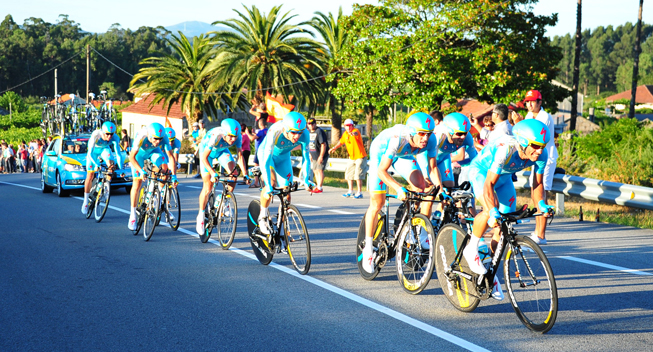Following the recent doping cases of the Iglinskiy brothers and Ilya Davidenok, Kazakhstan has decided to introduce a biometric passport program for domestic riders. All riders on the Kazakh continental teams and the Astana ProTeam will be covered by the testing when they are in Kazakhstan.
Kazakhstan’s National Anti-Doping Center and the Kazakhstan Cycling Federation will introduce biometric passport monitoring of domestic professional cyclists beginning in 2015. In a joint memorandum of cooperation signed this week, KazNADC and the KCF will take a giant leap forward in anti-doping methodology and practice.
“The importance of this document is difficult to overestimate. The memorandum is a significant part of the anti-doping program we have been developing in recent months in cooperation with the Center’s specialists and international experts. The program is aimed at preventing the use of banned substances listed by WADA,” said KCF Executive Director Dmitriy Muravyev.
“In Kazakhstan in 2015 we will introduce the world’s most advanced anti-doping system together with KazNADC, a fully-equipped laboratory with the latest technology, and with the support of international experts,” said Muravyev.
“Large-scale testing for riders of all ages, biometric passports and educational seminars are just a part of our long-term strategic anti-doping program, and we are counting on the support of the athletic community in its implementation,” Muravyev said.
Together in 2015 the KCF and KazNADC will implement a collaborative anti-doping campaign, with the following measures to be taken:
• Full Anti-Doping control implementation over Kazakhstan’s domestic cyclists from Continental Team Astana, Vino 4ever, Track Team Astana, and also Astana Pro Team while on Kazakh soil
• Collection of test samples from leading cyclists of all ages on regional and national teams by discipline (road, track, and mountain bike) throughout the domestic racing calendar
• Collaborative implementation with other agencies for Anti-Doping tests during regional, national and international competitions
• Training workshops, lectures and seminars on sports doping harm for regional sport schools and training academies, coaches and athletes by KCF and KazNADC representatives
• Systematic education and testing for trainers and staff on anti-doping rules theory and practice
• The widespread introduction of biometric passports among riders of all ages
Kazakhstan’s National Anti-Doping Center (KazNADC) was established in 2013 at the request and initiative of WADA (the World Anti-Doping Agency). KazNADC’s testing facility is one of 32 WADA-accredited anti-doping laboratories worldwide and is equipped with the latest testing technology. The WADA-accredited Central Asian Anti-Doping Center (RADOCA) is co-located with KazNADC’s laboratory, and operates all over Central Asia, Iran, Pakistan and Mongolia.
| Leonardo LEPIZ 32 years | today |
| Julie BROUWERS 22 years | today |
| Keien KOJIMA 28 years | today |
| Urte JUODVALKYTE 38 years | today |
| Kangning SHI 24 years | today |
© CyclingQuotes.com









